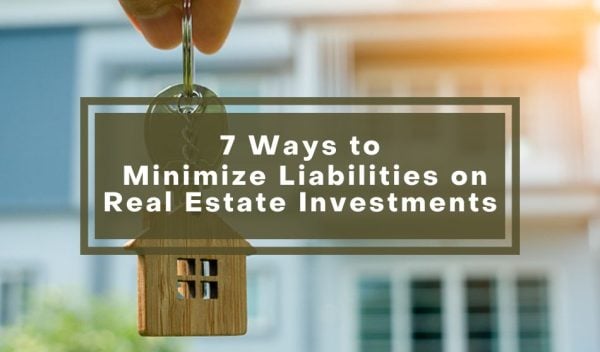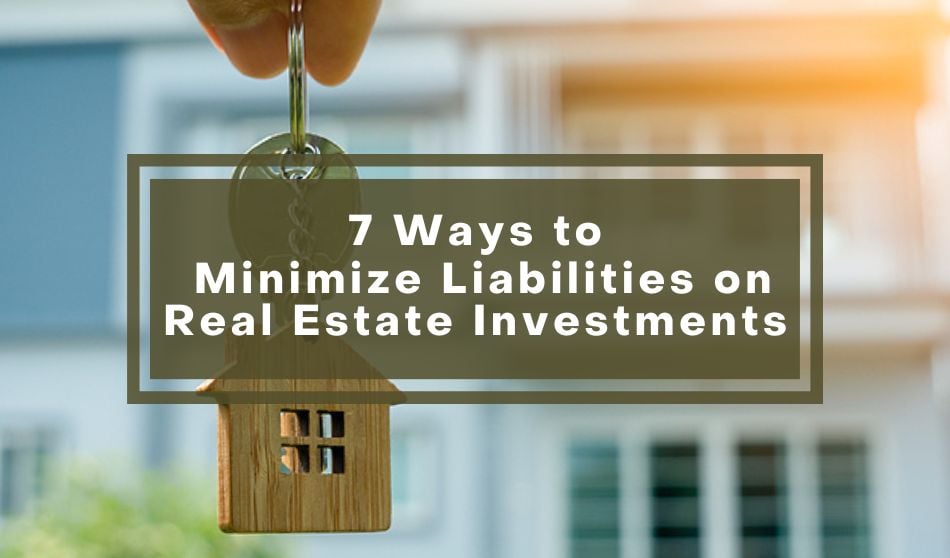
Nearly all investments come with risk, and savvy investors are, above all, managers of risk.
But truly minimizing your ongoing risks and liabilities goes way beyond the usual pre-deal financial projections and careful financing. It requires the constant, unglamorous work of maintenance, safety, insurance, and monitoring.
After all, if you’re not prepared to deal with worst-case scenarios, you’re only one tenant slip-and-fall away from financial peril. To help you protect yourself, let’s discuss seven ways to minimize your liabilities when it comes to your real estate investments.
Don’t Overextend Yourself
One of the biggest liabilities for real estate investors — but one that’s often overlooked — is putting too much money into an investment you can’t really afford. If the rental market takes an unexpected turn, you could find your cash flow choked off, with most or all of your tenant’s rent payment going toward the mortgage.
Worse yet, this high-stress financial situation could push you into an unvirtuous cycle of trying to save money in the short term by neglecting routine maintenance, resulting in the rapid deterioration of your property. In extreme cases, you may even have to sell the property.
When you’re shopping for an investment property, stay within your budget. Taking on a lot of risk could help you achieve your goals a little faster — or it could result in financial ruin.
Insist On Meticulous Inspections
Plenty of investment properties look great on the surface but have hidden flaws. Avoid getting stuck with one of these problematic properties by conducting careful inspections before you close any deals.
A thorough property inspection will assess all the major systems, including plumbing, electrical, and HVAC, as well as vital features like the roof and foundation. A good inspection will note the age and condition of each of these components and, by implication, help you estimate their probable lifespan before you’ll have to pay for a replacement. Information like this is incredibly valuable when you’re doing your financial projections.
Finally, make sure the inspections are being done by an experienced, licensed professional inspector who you trust. If you’ve found a good real estate agent, they can often recommend a well-qualified local inspector.
Screen Tenants Carefully
Before you buy any investment rental, you’ll likely look into local vacancy rates to calculate how much rent the property could realistically bring in. But that vacancy rate is only accurate if you’re signing good tenants.
High tenant turnover can wreck your financial projections, and low-quality tenants who neglect or actively damage the property will cost you a lot of money in the long run — not to mention the stress and anxiety they’ll put you through.
Landlords dealing with disrespectful or hostile tenants usually sour on their investments pretty quickly, often happy to dump them to a cash buyer instead of dealing with problem tenants.
Properly screening tenants can protect you from these negative outcomes. If you opt to work with a professional property management company, it may offer tenant screening as part of its service package. Standard tenant screening usually involves a credit check and contacting references.
Be especially thorough with that second part. Even if a prospective tenant’s first reference gives them a glowing review, make sure you contact the rest of the references they’ve supplied, just in case.
Require Renter’s Insurance
Renter’s insurance is extremely affordable, and most tenants won’t find it unreasonable if you require them to carry it. It truly is a win-win: A renter’s insurance policy protects the tenant’s property from theft and damage, and also protects your own property from expensive damage when the tenant is at fault.
If something major goes wrong with your property — say, a leaky roof or a burst water pipe — the tenant will have to pay only the deductible, and their policy will pay for the rest of the damage to their belongings. If the tenant was responsible for the issue, your tenant’s renters insurance can help cover their liability. Recovering even a small portion of the cost of repairs from an uninsured tenant is an extremely unlikely proposition.
Consider Using An LLC
LLC stands for “limited liability company,” and that’s exactly what it’s designed to do — limit your liability. Let’s say you own a property where someone is seriously injured, and you’re slapped with hefty damages.
If the property in question is owned by an LLC, the damages will be limited to the assets of that LLC — meaning your personal assets, like your home or cash savings, will be protected. Many investors place each individual investment property in its own LLC, so any potential liability is restricted and contained, in all but a few exceptions, and the rest of the portfolio is sheltered.
Learn more: Do I Need an LLC to be a Landlord?
Keep Your Properties In Good Shape
You can avoid a lot of liability just by keeping up with routine maintenance. Make sure all locks are operational and common areas are well-lit and secure. Consider installing security cameras in common areas like laundry rooms or entryways, as video footage is extremely valuable if someone is injured or falls victim to illegal activity on your property.
Inspect stairs and handrails. Make sure stairwells are well-lit, signage is clear, correct, and visible, and outdoor stairs are salted in the winter. Install anti-slip flooring if necessary. Ensure features like fitness areas or swimming pools are properly monitored and maintained. Monitor mail areas for accumulation of junk mail or unclaimed packages, which can be tripping hazards.
If this sounds like a lot, consider using a professional property management company. Just keep in mind that they generally charge a percentage of rent collected, so you’ll need to evaluate your financial goals before making the switch.
Carry The Proper Insurance
While we touched on renter’s insurance for your tenants, you should also carry other types of insurance policies.
Landlord insurance is necessary to cover a rental property. Unlike a general homeowners insurance policy, landlord insurance covers liability and damages connected to tenant-occupied homes. Depending on the insurance company you work with and the options you choose, your policy may can even cover things like third-party injuries or property damage if you’re deemed personally responsible.
When looking for a policy, ensure that your coverage reasonably covers “acts of God” like extreme weather, natural disasters, or other catastrophes that damage your investment property. A truly comprehensive landlord insurance policy will cover almost any eventuality you’re on the hook for.
Finally, many policies typically cover flooding, so you’ll need a specialized flood insurance policy if you’re located in a flood-prone area.






